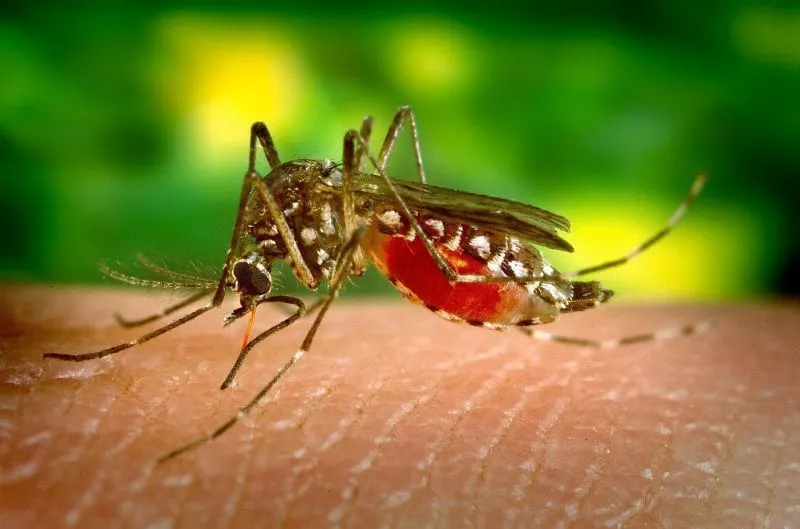Singapore sees 65-80% fewer dengue cases in areas where disease-fighting mosquitoes released
Singapore sees 65-80% fewer dengue cases in areas where disease-fighting mosquitoes released


Releasing mosquitoes into the corridors of apartment complexes might seem like an unusual strategy for a city fighting its worst recorded outbreak of dengue, a painful disease spread between humans by mosquitoes. But the thousands of little insects discharged [the last week of August] weren’t your average mosquitoes.
They were bred in a laboratory to carry a substance not commonly found in this type of mosquito: bacteria called Wolbachia. When the bacteria-laden male mosquitoes are released into the open and mate with naturally-born females, the resultant eggs won’t hatch.
The outcome is [a] reduced number of dengue cases in the areas where the lab-bred insects were released, according to Singapore’s government.
…
A team led by Zhiyong Xi, a professor at Michigan State University’s Department of Microbiology and Molecular Genetics used long, thin glass needles to inject Wolbachia into mosquito eggs …. that had been laid 90 minutes before. Upon hatching, the larvae also contained the bacteria. That first generation passed the Wolbachia bacteria on to its descendants, birthing a new line of bacteria-infused mosquitoes whose eggs were shipped to Singapore ….
…
Singapore’s government says that in parts of the city where its males have been released there were 65% to 80% fewer dengue cases compared with areas where the mosquitoes weren’t released. Mosquitoes are now being discharged in 5% of the city’s public housing blocks. The releases are slated to expand to 15% of them by 2022.
Read the original post (Behind paywall)

 | Videos | More... |

Video: Nuclear energy will destroy us? Global warming is an existential threat? Chemicals are massacring bees? Donate to the Green Industrial Complex!
 | Bees & Pollinators | More... |

GLP podcast: Science journalism is a mess. Here’s how to fix it

Mosquito massacre: Can we safely tackle malaria with a CRISPR gene drive?

Are we facing an ‘Insect Apocalypse’ caused by ‘intensive, industrial’ farming and agricultural chemicals? The media say yes; Science says ‘no’
 | Infographics | More... |

Infographic: Global regulatory and health research agencies on whether glyphosate causes cancer
 | GMO FAQs | More... |

Why is there controversy over GMO foods but not GMO drugs?

How are GMOs labeled around the world?

How does genetic engineering differ from conventional breeding?
 | GLP Profiles | More... |

Alex Jones: Right-wing conspiracy theorist stokes fear of GMOs, pesticides to sell ‘health supplements’




 California, Washington, Oregon forge immunization alliance to safeguard vaccine access against federal undermining
California, Washington, Oregon forge immunization alliance to safeguard vaccine access against federal undermining Trust issues: What happens when therapists use ChatGPT?
Trust issues: What happens when therapists use ChatGPT? Fighting deforestation with CO2: Biotechnology breakthrough creates sustainable palm oil alternative for cosmetics
Fighting deforestation with CO2: Biotechnology breakthrough creates sustainable palm oil alternative for cosmetics Viewpoint — Fact checking MAHA mythmakers: How wellness influencers and RFK, Jr. undermine American science and health
Viewpoint — Fact checking MAHA mythmakers: How wellness influencers and RFK, Jr. undermine American science and health 30-year-old tomato line shows genetic resistance to devastating virus
30-year-old tomato line shows genetic resistance to devastating virus Viewpoint: Video — Big Solar is gobbling up productive agricultural land and hurting farmers yet providing little energy or sustainabilty gains
Viewpoint: Video — Big Solar is gobbling up productive agricultural land and hurting farmers yet providing little energy or sustainabilty gains The free-range chicken dilemma: Better for birds, but with substantial costs
The free-range chicken dilemma: Better for birds, but with substantial costs ‘You have to treat the brain first’:Rethinking chronic pain with Sanjay Gupta
‘You have to treat the brain first’:Rethinking chronic pain with Sanjay Gupta
